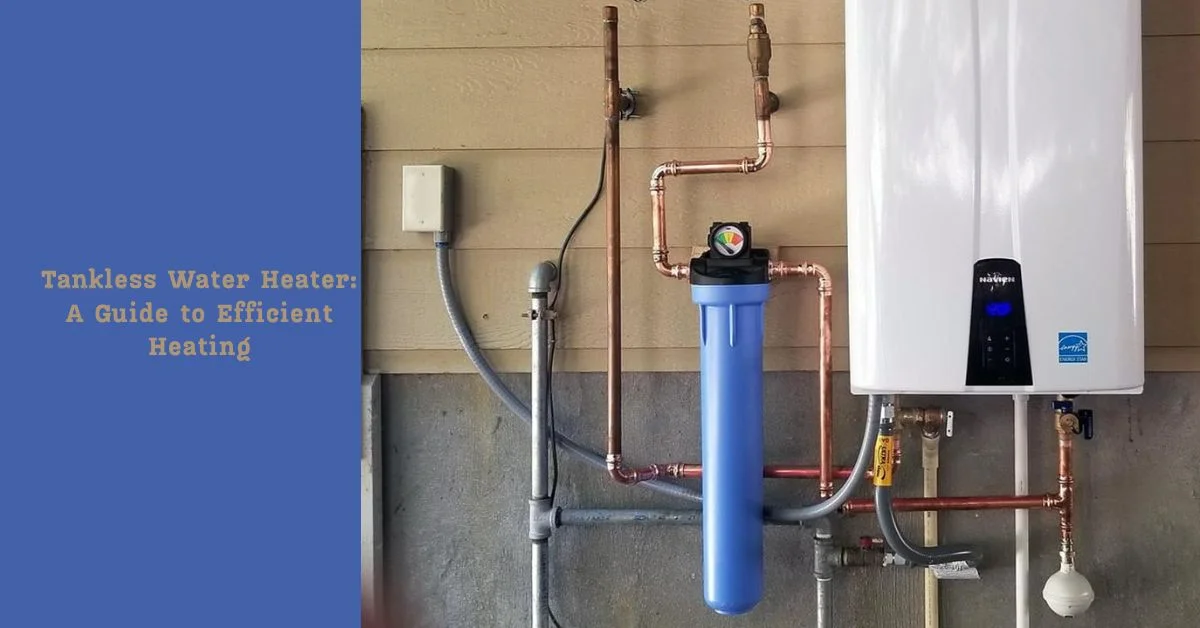Introduction: What is a Tankless Water Heater?
A tankless water heater, also known as an on-demand water heater, is a modern solution for providing hot water without the need for a bulky storage tank. Unlike traditional water heaters that store and constantly heat a large amount of water, tankless water heaters heat water only when you need it. This innovation not only saves energy but also provides a constant supply of hot water, making it a popular choice for homes and businesses alike.
How Do Tankless Water Heaters Work?
Tankless water heaters work by heating water directly as it flows through the unit. Here’s a step-by-step breakdown:
- Activation: When you turn on a hot water tap, the flow sensor in the tankless water heater detects the water flow.
- Heating Process: Once activated, the heater uses either gas or electricity to heat the water instantly.
- Hot Water Supply: The heated water flows to your tap, shower, or appliance.
Because there’s no storage tank, you never run out of hot water as long as the unit can handle the water flow rate.
Benefits of Tankless Water Heaters
1. Energy Efficiency
Tankless water heaters only heat water when needed, eliminating the energy wasted by constantly reheating water in a tank. This leads to lower energy bills and a smaller carbon footprint.
2. Endless Hot Water Supply
Since tankless water heaters don’t store water, they provide a continuous supply of hot water. Whether you’re taking a shower, doing laundry, or washing dishes, you’ll never run out of hot water again.
3. Compact Size
Traditional water heaters take up significant space in your home. Tankless units are much smaller, allowing you to save space and reduce clutter.
4. Longer Lifespan
Tankless water heaters typically last 20 years or more, while traditional tank water heaters usually need replacement after 10-15 years. This makes tankless units a more cost-effective long-term investment.
5. Lower Risk of Water Damage
Since tankless water heaters don’t have a tank that could potentially burst or leak, there’s less risk of water damage to your home.
Tankless Water Heater vs. Traditional Water Heater
| Feature | Tankless Water Heater | Traditional Water Heater |
|---|---|---|
| Hot Water Supply | Unlimited on-demand | Limited by tank capacity |
| Energy Efficiency | High (only heats when needed) | Lower (heats and stores continuously) |
| Space Requirements | Compact and space-saving | Bulky, takes up more space |
| Installation Cost | Higher initial cost | Lower initial cost |
| Lifespan | 20+ years | 10-15 years |
Types of Tankless Water Heaters
There are two main types of tankless water heaters:
1. Electric Tankless Water Heaters
Electric models are easier to install and typically work well in homes with lower hot water demand. They are ideal for small to medium-sized households or locations where natural gas isn’t available.
2. Gas Tankless Water Heaters
Gas models are more powerful and capable of handling larger homes or higher water demands. They are more expensive to install but offer better efficiency for larger households or commercial applications.
How to Choose the Right Tankless Water Heater
Choosing the right tankless water heater for your home involves considering several factors:
1. Flow Rate
The flow rate is measured in gallons per minute (GPM) and determines how much hot water the unit can supply at once. You need to match the flow rate with your household’s needs. For example:
- A shower typically requires 2.5 GPM.
- A dishwasher requires around 1.5 GPM.
- A washing machine needs approximately 2 GPM.
2. Temperature Rise
Temperature rise refers to how much the water temperature needs to be increased to reach the desired temperature. The colder your incoming water, the more power the heater needs to supply to achieve the desired temperature.
3. Fuel Type
If you already have access to natural gas, a gas-powered tankless water heater may be a cost-effective option. However, if electricity is your only option, an electric tankless water heater might be more suitable.
Installation and Maintenance
Installation
While tankless water heaters are energy-efficient, installation can be complex. It’s essential to hire a professional plumber or technician to ensure proper installation and avoid potential issues. The cost of installation varies depending on the unit type and your home’s existing infrastructure.
Maintenance
Tankless water heaters require regular maintenance, such as descaling to remove mineral buildup, especially in areas with hard water. Regular servicing can extend the lifespan of the unit and maintain its efficiency.
FAQs about Tankless Water Heaters
1. Do Tankless Water Heaters Save Money?
Yes, tankless water heaters are energy-efficient, which can lower your monthly utility bills. However, the initial installation cost is higher than traditional water heaters, so it may take several years to recoup your investment.
2. How Long Do Tankless Water Heaters Last?
Tankless water heaters generally last longer than traditional water heaters, with a typical lifespan of 20 years or more with proper maintenance.
3. Can Tankless Water Heaters Provide Enough Hot Water for a Large Family?
Yes, tankless water heaters can provide enough hot water for large families, especially gas-powered models. However, you may need to choose a unit with a higher flow rate to meet the demand.
4. Do I Need to Replace My Existing Plumbing to Install a Tankless Water Heater?
In most cases, no. However, depending on your home’s plumbing and the unit’s specifications, some upgrades may be necessary.
Conclusion: Is a Tankless Water Heater Right for You?
Tankless water heaters offer numerous benefits, including energy savings, endless hot water, and space efficiency. While the initial investment can be higher than traditional water heaters, the long-term benefits make them a smart choice for many homeowners. By understanding your household’s needs and choosing the right unit, you can enjoy an efficient and reliable hot water supply for years to come.
Check out our previous article for more insights on Ennuifans.


